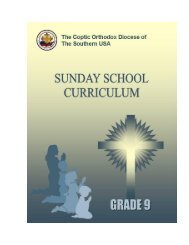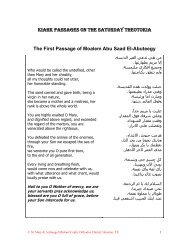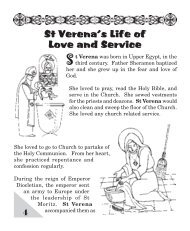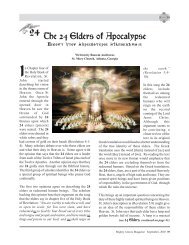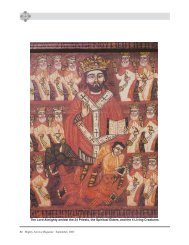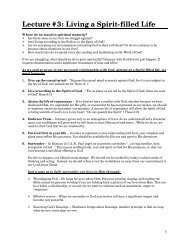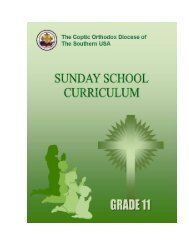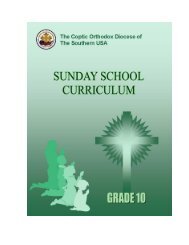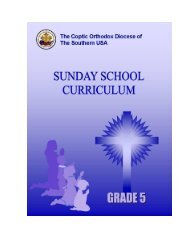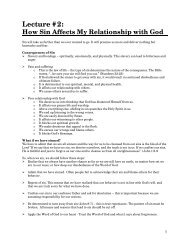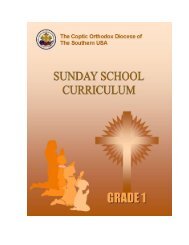Grade 12 - Coptic Orthodox Diocese of the Southern United States
Grade 12 - Coptic Orthodox Diocese of the Southern United States
Grade 12 - Coptic Orthodox Diocese of the Southern United States
You also want an ePaper? Increase the reach of your titles
YUMPU automatically turns print PDFs into web optimized ePapers that Google loves.
Sunday School Curriculum <strong>Grade</strong> <strong>12</strong><br />
cancel or thwart it. Moreover, <strong>the</strong> commandment is a tie <strong>of</strong> love between God and Adam.<br />
Adam obeys God‘s words as a sign <strong>of</strong> sincere love and trusts in Him and <strong>the</strong>refore deserves a<br />
good reward.<br />
IV. How Did Man Fall?<br />
Adam‘s nature was not inclined to evil. His fall proceeded from his own free will, which he<br />
projected into a prohibited larger scope. By obeying <strong>the</strong> evil one Adam fell and committed<br />
evil, which he did not know. What he did know, however, was that <strong>the</strong> result <strong>of</strong> evil is death.<br />
V. The State Of Man After His Fall<br />
He started to fear God, who loved him, and <strong>the</strong> voice <strong>of</strong> indictment and punishment filled his<br />
being ―You should surely die.‖<br />
His will to do well weakened as <strong>the</strong> Spirit <strong>of</strong> God left him, while <strong>the</strong> knowledge <strong>of</strong> good and<br />
evil introduced in him an enormous duality and inner conflict. It became impossible for man,<br />
however hard he resisted, to progress even one step towards eternity alone. This is due to <strong>the</strong><br />
soul that is impotent in <strong>the</strong> lace <strong>of</strong> directing its conscience towards matters above its<br />
potentials, all on its own.<br />
The crack in man‘s being:<br />
a) Within himself: a conflict between <strong>the</strong> spirit and <strong>the</strong> body and between <strong>the</strong> conscience<br />
and <strong>the</strong> self.<br />
b) Between himself and o<strong>the</strong>rs: egoism (<strong>of</strong> Adam), hatred and envy (<strong>of</strong> Cain).<br />
c) Between him and <strong>the</strong> creation: upon losing God‘s image within him, he lost his power<br />
over <strong>the</strong> earth and nature, which began to revolt against him.<br />
VI. Man’s Salvation<br />
Man‘s salvation takes place through incarnation (and hence <strong>the</strong> shedding <strong>of</strong> blood). In this act,<br />
God united Himself with man so that His life might flow into man and consequently be<br />
granted to him. In o<strong>the</strong>r words, man renews God‘s image in him and shares God‘s love, glory<br />
and holiness. This does not mean that man achieves <strong>the</strong> essence <strong>of</strong> God, but it makes him, as<br />
St. Peter says, ―partakers <strong>of</strong> <strong>the</strong> divine nature‖ (2 Peter 1:4).<br />
Having experienced <strong>the</strong> features <strong>of</strong> God‘s love to us, we understand <strong>the</strong> quality <strong>of</strong> love we<br />
should show our neighbors on <strong>the</strong> level <strong>of</strong> <strong>the</strong> family, <strong>the</strong> Church, <strong>the</strong> country, and <strong>the</strong> whole<br />
world. This is what Jesus requested, ―that you love one ano<strong>the</strong>r, as I have loved you‖ (John<br />
15:<strong>12</strong>).<br />
VII. Christian Love Embodies The Following Characteristics<br />
It is founded upon self-sacrifice, ―By this we know love <strong>of</strong> God, because He laid down His<br />
life for us and we also ought to lay down our lives for <strong>the</strong> brethren‖ (1 John 3:16).<br />
It is embellished by sharing, ―who is weak, and I am not weak? Who is made to stumble, and<br />
I do not burn with indignation?‖ (2 Corinthians 11:29)<br />
On <strong>the</strong> plane <strong>of</strong> <strong>the</strong> will and <strong>of</strong> work, ―my little children, let us not love in word, or in tongue;<br />
but in deed and in truth‖ (1 John 3:18).<br />
Gratuitous, unconditional love, ―for when we were still without strength, in due time Christ<br />
died for <strong>the</strong> ungodly‖ (Romans 5:6-8).<br />
Love that is specifically directed towards those in suffering, deep need, and <strong>the</strong> oppressed.<br />
76 NOVEMBER



